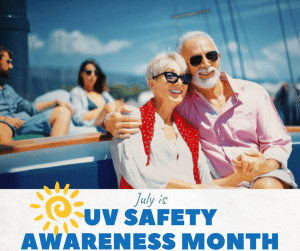Home » News and Events » July is UV Awareness Month
July is UV Awareness Month
Posted by: Florida Eye Microsurgical Institute in Eye Health

We welcomed summer last week, and this week, we celebrate National Sunglasses Day on June 27, 2024. As we approach July, which marks UV Safety Month, it’s a perfect time to grab your best sunglasses while you are out and about to enjoy your favorite summer activities. Did you know it wasn’t until the 1900s that sunglasses became popular and widely used, especially among Hollywood celebrities? Before that, people used various methods to protect their eyes from the sun, such as using flat panels of smoky quartz to block the sun’s glare.
There is much information on protecting your skin from UV rays during the summer, but we want to remind you not to forget about protecting your eyes. Exposure to bright sunlight increases the risk of developing macular degeneration, a leading cause of vision loss in older adults, cataracts, a clouding of the eye’s lens that can lead to vision loss, and growths on the eye, including cancer. These health risks are severe and can have a significant impact on your vision and overall health.
What Time of The Day Is The Most Hazardous For UV Exposure?
When most people are outdoors, the time between 10 AM and 4 PM is the most harmful for UV Rays. This is because the sun is at its highest point in the sky during these hours, and its rays are more direct and intense. Protect your eyes during these peak sun times.
What Are Ultraviolet (UV) Rays?
According to the Centers for Disease Control and Prevention (CDC), ultraviolet (UV) rays are a form of non-ionizing radiation emitted by the sun and artificial sources such as tanning beds. While UV rays have some benefits for people, including creating Vitamin D, they can also cause health risks.
What are the three types of UV rays?
- Ultraviolet A (UVA)
- Ultraviolet B (UVB)
- Ultraviolet C (UVC)
Here are some UV Eye Safety Tips from the American Academy of Ophthalmology:
- Don’t focus on the sunglass lens’s darkness; select quality sunglasses that block UV rays.
- Ensure your sunglasses have 100 percent protection and block UV-A and UV-B rays.
- Wrap-around sunglasses are ideal so the sun’s rays can’t enter from the side.
- If you wear contact lenses with UV protection, don’t forget to wear your sunglasses.
- Wear your sunglasses on cloudy days as sun rays can pass through the haze and thin clouds.
- Wear a hat in addition to your sunglasses to protect your eyes.
- Never look directly at the sun anytime!
- Don’t forget the kids; protect their eyes with hats and sunglasses.
Following these simple yet effective tips, you can bask in the sun’s warmth while ensuring your eyes are well-protected. It’s important to remember that sun damage is not limited to the summer months; it can occur year-round. This knowledge empowers us to always be vigilant about our eye health.
Enjoy Your Summer Safely!

